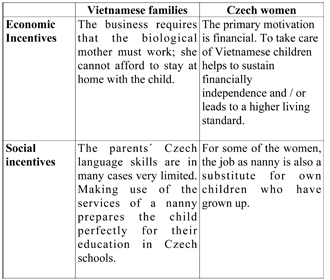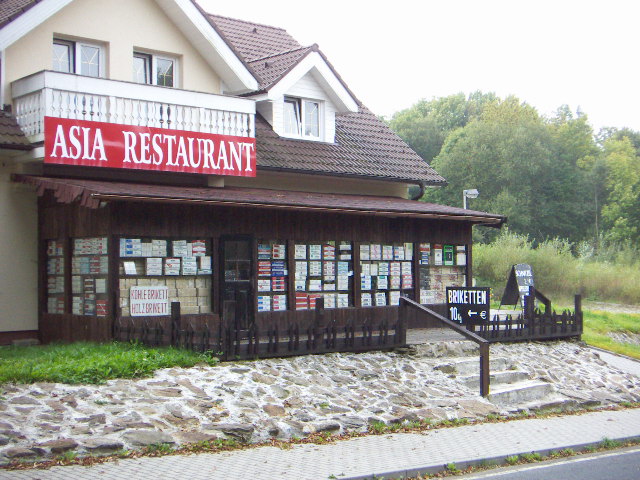1 The practice
1.1 Description of the project
Unlike most other practices presented on the Interculture -Map portal, the very common usage of Czech nannies to educate children from Vietnamese families is in no way linked to a formal organisation, company or government institution. This interesting example of a highly successful intercultural practice is instead the result of informal agreements between Vietnamese families and Czech women, who are either in senior citizens or unemployed. Alone in the city of Cheb, where an estimated fifth of the city’s 35,000 inhabitants are migrants from Vietnam, it can be estimated that these informal (and, from the point of view of financial authorities, illegal) arrangements create employment for several hundred Czech women.
This description is mainly based on interviews with Czech women working as nannies in the city of Cheb. The Czech Republic’s current tax system provides strong incentives to perform this work in an informal way. To protect our interview partners, we will not provide names or contact information of the persons interviewed.
1.2 Time, structure and steps of the project
Due to the lack of an external sponsor or initiator, it is in the case of this practice impossible to speak of “project objectives”. Instead, we summarized in the table below what motivated the participating partners (Vietnamese families, Czech mothers) to seek or accept taking part in these informal arrangements.

Since the practice helped to prevent the emergence of many typical problems, which trouble many other immigrant communities in Europe, it would now be appropriate to describe the practice in regard to its impact on the wider community:
- the pre-school education of Vietnamese children by Czech nannies reduces integration difficulties at school;
- the practice leads to increased social interactions between Vietnamese and Czech families;
- the second generation has very strong personal ties within the Czech community in the city.
1.3 Place and context
The first group of Vietnamese came to Czechoslovakia as “contract workers” to “labour off” their country’s debt in the late 1970’s. Living highly segregated from the domestic population, the Vietnamese were not allowed to have children. After the end of the socialist regime, many Vietnamese began to make their living in trade, especially in the border regions with Germany and Austria. One of the places they settled was the city of Cheb, which despite its relatively small size of 35,000 and a rather remote geographical location, is today one of the Czech Republic’s most multicultural cities. For additional information about the life of the Vietnamese minority in the city, we recommend the Interculture Map background report (include hypertext link).
1.4 Target
The practice delivers benefits to: Vietnamese families, Czech women, and children from Vietnamese families

1.5 Methodology
Being no longer restricted in founding families after 1990, the Vietnamese community soon experienced the birth of their first children. In their home country, it was usually the task of the grandparents to take care of the children. In the foreign environment, the Vietnamese families were confronted with the need to find a different arrangement. As described in greater detail in the above-mentioned report (hyperlink), the Vietnamese community in Cheb is dominated by hierarchic clan structures. The ordinary Vietnamese need to deliver parts of their income to the “bosses” of the community. In addition to this many of the Vietnamese pay money to their families back home, which is often “invested” collectively to arrange the emigration papers for one family member. These and other financial constrains preclude the option, that one of the parents would take care of the children. Due to this situation, the Vietnamese began to look for Czech women who would be willing to take care of their children. In the beginning, they found interested women through newspaper advertisements. Later, the arrangements were mostly made on the basis of informal recommendations.
Many Vietnamese families work seven days a week from the morning to the evening. To be a nanny is hence a very demanding and highly responsible profession. Our interviewees stated that they would try to cope with this by cooperating with other nannies, even though the Vietnamese parents would often not like the idea that the care for the child is transferred to another person. Most parents would also prefer if their child is the only child that is taken care of. Despite of this, the nannies interviewed for this study managed to convince the parents that the child would not suffer if they take care of more than one child at once. From the perspectives of the nannies, this obviously increases the otherwise rather problematic relationship between work input and reimbursement (which is usually not higher than € 200,00 per child). This salary includes spending for feeding and bathing the child
In many cases, the responsibility for the children is transferred already at the early age of six weeks. The work continues at least until the child reaches school age. If the Vietnamese parents can afford to continue paying for childcare, the nannies continue to supervise the child until it is 10 or 12. Due to the usually very close contact between child and foster mother, the social contact prevails often much longer than this period.
2 Hints for an evaluation
|